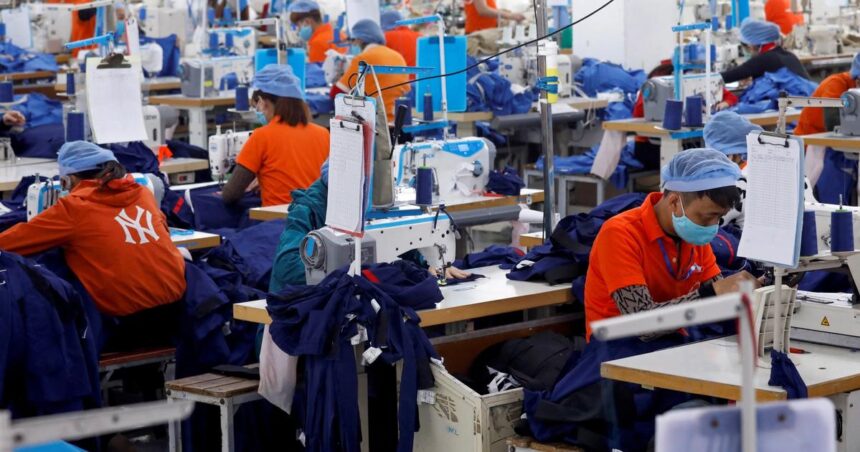The World Bank delivered a stark warning yesterday that former President Trump’s promised tariffs could slash global growth by nearly 1% over the next three years, potentially triggering a widespread economic slowdown. The assessment came as financial markets continue their nervous adjustment to America’s dramatic policy shift.
“We’re looking at a potential restructuring of global trade relationships unlike anything we’ve seen since the formation of the WTO,” said World Bank Chief Economist Carmen Reinhart during a press briefing in Washington. “The ripple effects would touch virtually every economy, with developing nations particularly vulnerable.”
The report estimates that Trump’s proposed 60% tariffs on Chinese goods and 10-20% on all other imports would reduce global GDP by approximately $985 billion through 2027. For context, that’s roughly equivalent to eliminating the entire annual economic output of the Netherlands.
Standing outside the IMF headquarters yesterday, I spoke with several finance ministers attending the institution’s summer meetings. The mood was decidedly grim. “We’re preparing for significant disruption,” acknowledged Brazil’s Finance Minister Fernando Haddad, whose country faces potential 10% tariffs on its $31 billion in annual exports to the United States.
The economic modeling reveals a complex cascade of consequences. American consumers would face immediate price increases across thousands of product categories – from electronics to clothing to automobiles. Morgan Stanley estimates the average American household could pay $3,900 more annually for the same basket of goods.
But the second-order effects could prove even more damaging. Countries targeted by U.S. tariffs typically respond in kind, creating cycles of retaliation. After Trump’s 2018 steel and aluminum tariffs, the EU, China, and Canada imposed counter-tariffs on over $46 billion in American exports.
“This isn’t just about trade balances – it’s about fundamentally rewiring global supply chains that took decades to build,” explained Laura Tyson, former chair of the U.S. Council of Economic Advisers under President Clinton, when I interviewed her via video call from Berkeley.
The World Bank report highlights particular vulnerability in Southeast Asia, where economies like Vietnam and Malaysia have positioned themselves as manufacturing alternatives to China. Their export-driven growth models now face existential threats if Trump’s tariffs materialize as promised.
For American workers, the picture is mixed. The Peterson Institute for International Economics estimates that protected industries like steel and aluminum could add approximately 145,000 jobs. However, industries dependent on imported components or facing retaliatory tariffs could lose over 430,000 positions – a net negative of nearly 300,000 jobs.
Walking through Cincinnati’s manufacturing district last week, I met James Thornton, a 58-year-old steel fabricator who embodies this contradiction. “I got a raise after the last steel tariffs,” he told me while on his lunch break. “But then my son lost his job at a furniture maker when their imported parts got too expensive. So did we really win?”
Financial markets have already begun pricing in the uncertainty. The CBOE Volatility Index, Wall Street’s “fear gauge,” has climbed 22% since Election Day, while multinational corporations with extensive global supply chains have seen their stock prices underperform domestic-focused companies by nearly 8%.
Some economists see potential benefits amid the disruption. “There’s a legitimate argument for rebalancing some trading relationships and bringing strategic manufacturing back to American shores,” acknowledged Harvard economist Dani Rodrik, who has long critiqued aspects of unfettered globalization. “But unilateral tariffs are a blunt and costly way to achieve those goals.”
The Treasury Department declined specific comment on the World Bank findings, though Secretary Janet Yellen has previously cautioned against broad-based tariffs. “History has shown that tariff escalation typically creates more economic problems than it solves,” she said at a recent Council on Foreign Relations event.
For ordinary citizens worldwide, the stakes extend beyond macroeconomic indicators. Higher prices for consumer goods could drive inflation just as central banks have finally tamed it. Developing nations dependent on exports could face unemployment spikes and currency instability.
Emerging market currencies have already depreciated an average of 4.2% against the dollar since the election, according to Bloomberg data, as investors anticipate trade disruption.
The World Bank report concludes with an urgent call for multilateral dialogue rather than unilateral action. “The global trading system needs reform,” the report acknowledges, “but dismantling it would harm the very workers and communities that trade policy should protect.”
As leaders gather for next month’s G20 summit in Rio de Janeiro, preventing a slide into destructive trade warfare will likely top the agenda. Whether they succeed may determine the economic trajectory for millions of workers and consumers around the world.






